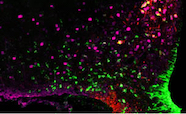How does the brain control body weight and metabolism?

Obesity and metabolic disorders are an increasing threat to our health. At the Centre for Neuroendocrinology we want to know what affects our brain's ability to control these functions.
The Centre has a strong emphasis on understanding the neuroendocrine control of body weight and blood glucose levels, and on understanding the developmental origins of diseases associated with obesity and diabetes during pregnancy.
State of the art techniques such as metabolic phenotyping, gene therapy, and generation of conditional transgenic animals are utilised to address our current research questions.
Neuroendocrine regulation of body weight
The subjective experiences of hunger and satiation are controlled, at least in part, by hormones from the gastrointestinal tract and adipose tissue, such as leptin, insulin and ghrelin. Under normal conditions the relationship between these hormones enables us to maintain weight without dramatic increases or decreases. Metabolic disorders, however, are becoming much more prevalent in our society. Understanding the regulation of these hormones, as well as our body's response to them, is crucial for understanding these metabolic issues.
Some of the questions we're examining around the neuroendocrine regulation of body weight include:
What is the cause and consequences of leptin resistance?
What is the role of brain inflammation in obesity?
Why is food intake increased during pregnancy?
Neuroendocrine regulation of blood glucose levels
Blood glucose levels, regulated by the hormones insulin and glucagon, need to be maintained in order for the body and the brain to function correctly. When the body no longer responds to these regulating hormones as it should, or can no longer produce them, metabolic issues arise. Accumulating evidence suggests that the brain plays an important role in regulating glucose levels in the body.
Our questions include:
How does the brain control blood glucose levels?
Do leptin and insulin work together to regulate blood glucose levels?
What causes gestational diabetes?
Developmental origins of disease
For those who are pregnant metabolic challenges affect not only their own body and brain, but the developing body and brain of their child. Obesity and gestational diabetes pose similar risks to development as infection or high levels of stress. It is unclear why this occurs, what inputs the developing fetus receives that even indicates that the mother is obese or experiencing gestational diabetes. In order to identify those children at risk of being impacted by these challenges we must first understand what is being impacted, and whether there are other factors which put these children at risk.
Some of the questions we're examining around the developmental origins of disease include:
